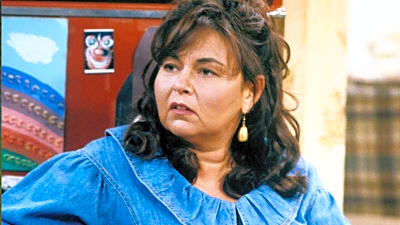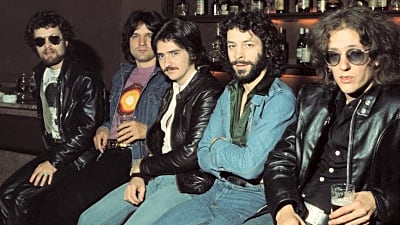- Home
- Quizzes
- My Quiz Activity
- Newsletters
- MY FAVORITES
- Add Sports/Teams
- SPORTS
-
NFL
- NFL Home
- Arizona Cardinals
- Atlanta Falcons
- Baltimore Ravens
- Buffalo Bills
- Carolina Panthers
- Chicago Bears
- Cincinnati Bengals
- Cleveland Browns
- Dallas Cowboys
- Denver Broncos
- Detroit Lions
- Green Bay Packers
- Houston Texans
- Indianapolis Colts
- Jacksonville Jaguars
- Kansas City Chiefs
- Las Vegas Raiders
- Los Angeles Chargers
- Los Angeles Rams
- Miami Dolphins
- Minnesota Vikings
- New England Patriots
- New Orleans Saints
- New York Jets
- New York Giants
- Philadelphia Eagles
- Pittsburgh Steelers
- San Francisco 49ers
- Seattle Seahawks
- Tampa Bay Buccaneers
- Tennessee Titans
- Washington Commanders
-
MLB
- MLB Home
- Athletics
- Arizona Diamondbacks
- Atlanta Braves
- Baltimore Orioles
- Boston Red Sox
- Chicago White Sox
- Chicago Cubs
- Cincinnati Reds
- Cleveland Guardians
- Colorado Rockies
- Detroit Tigers
- Houston Astros
- Kansas City Royals
- Los Angeles Angels
- Los Angeles Dodgers
- Miami Marlins
- Milwaukee Brewers
- Minnesota Twins
- New York Yankees
- New York Mets
- Philadelphia Phillies
- Pittsburgh Pirates
- San Diego Padres
- San Francisco Giants
- Seattle Mariners
- St. Louis Cardinals
- Tampa Bay Rays
- Texas Rangers
- Toronto Blue Jays
- Washington Nationals
-
NBA
- NBA Home
- Atlanta Hawks
- Boston Celtics
- Brooklyn Nets
- Charlotte Hornets
- Chicago Bulls
- Cleveland Cavaliers
- Dallas Mavericks
- Denver Nuggets
- Detroit Pistons
- Golden State Warriors
- Houston Rockets
- Indiana Pacers
- Los Angeles Clippers
- Los Angeles Lakers
- Memphis Grizzlies
- Miami Heat
- Milwaukee Bucks
- Minnesota Timberwolves
- New Orleans Pelicans
- New York Knicks
- Oklahoma City Thunder
- Orlando Magic
- Philadelphia 76ers
- Phoenix Suns
- Portland Trail Blazers
- Sacramento Kings
- San Antonio Spurs
- Toronto Raptors
- Utah Jazz
- Washington Wizards
-
NHL
- NHL Home
- Anaheim Ducks
- Boston Bruins
- Buffalo Sabres
- Calgary Flames
- Carolina Hurricanes
- Chicago Blackhawks
- Colorado Avalanche
- Columbus Blue Jackets
- Dallas Stars
- Detroit Red Wings
- Edmonton Oilers
- Florida Panthers
- Los Angeles Kings
- Minnesota Wild
- Montreal Canadiens
- Nashville Predators
- New Jersey Devils
- New York Islanders
- New York Rangers
- Ottawa Senators
- Philadelphia Flyers
- Pittsburgh Penguins
- San Jose Sharks
- Seattle Kraken
- St. Louis Blues
- Tampa Bay Lightning
- Toronto Maple Leafs
- Utah Mammoth
- Vancouver Canucks
- Vegas Golden Knights
- Washington Capitals
- Winnipeg Jets
- NCAAF
- NCAAM
- Olympics
- Boxing
- Entertainment
- Lifestyle
- Golf
- MMA
- Soccer
- Tennis
- Wrestling
- Sports Betting
- More Sports
- RESOURCES
- My Account
- YB on Facebook
- YB on Twitter
- YB on Flipboard
- Contact Us
- Privacy Policy
- Terms of Service
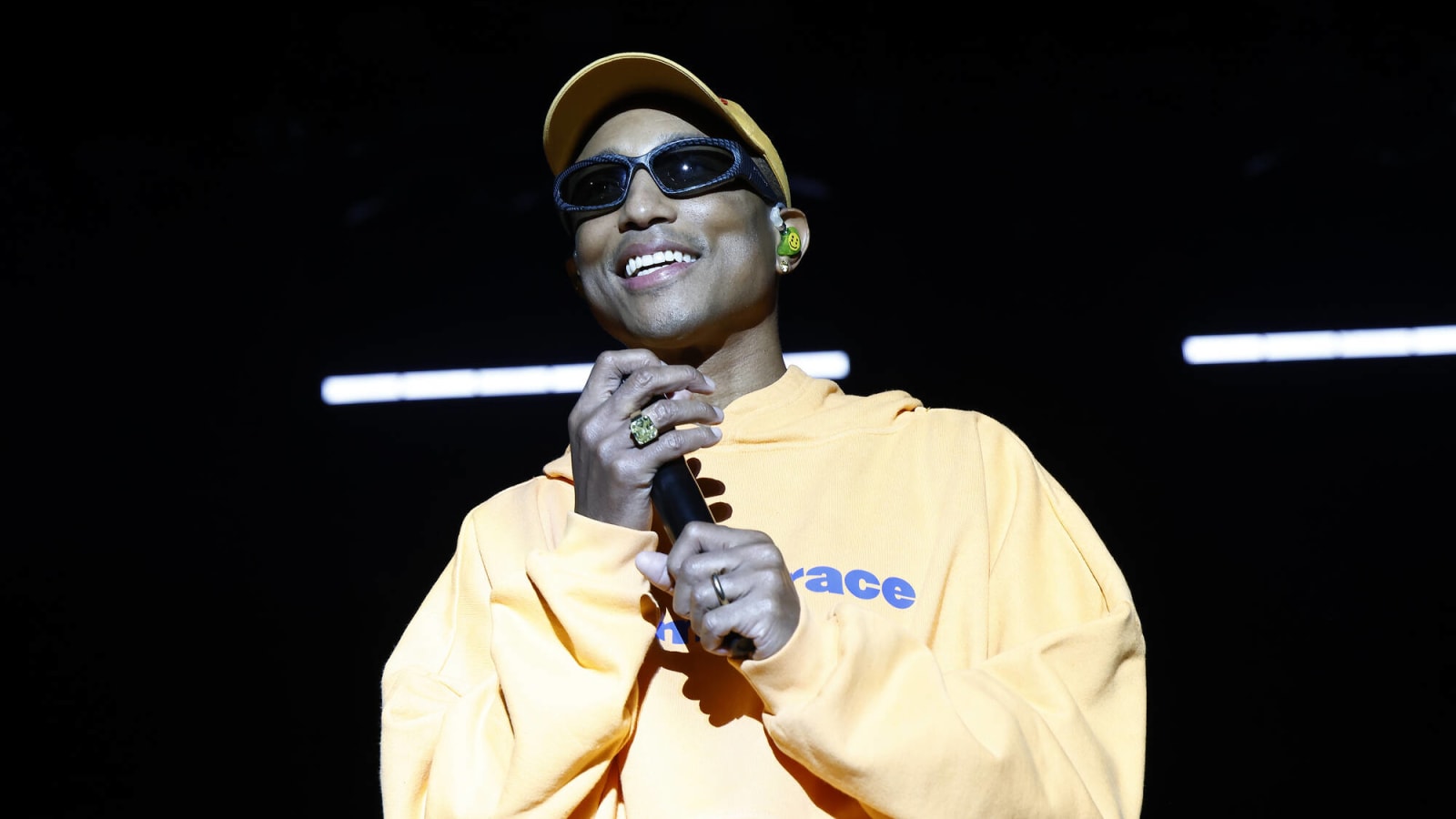
The greatest music producers of all time
The role of the music producer has never been static. While many think that a producer walks into the studio and hits the big red "record" button, their role is much more dynamic than that. Over the years, the producer doesn't just set up the mics but also counsels the artist in front of the mic. They cut songs, make certain instruments pop in the mix, and in the modern pop and hip-hop era, may very well be responsible for every instrument on the track.
There is a litany of amazing producers who didn't make this cut (so apologies to John Hammond, Conny Plank, Jeff Lynne, Linda Perry, No I.D., and many others), but this is a list for legends only. So let's celebrate people responsible for bringing your favorite albums to life by presenting the greatest music producers of all time in random order.
Brian Eno

Of all the producers on this list, none have a resume wilder than that of Brian Eno. The one-time Roxy Music keyboardist would later spend years in the studio cranking out his own avant-pop and genre-defining ambient albums while also lending his skills to some of the world's most innovative rock acts. He played with David Bowie during his famed "Berlin Trilogy" of albums, frequently collaborated with King Crimson guitarist Robert Fripp, and perhaps most famously helped acts like Talking Heads and U2 find their true artistic voice in the studio.
Notoriously prickly towards the press, Brian Eno pays his bills helping acts like Coldplay make the best albums of their career and then turns around to make any number of boundary-pushing solo records. He even sells a box of cards called "Oblique Strategies" that he frequently uses in the studio to flip or alter the recording process, challenging artists to stay on their toes (i.e., suggestions like "do it backward" or "make it more sensual"). Still active to this day, Brian Eno's influence is unmatched.
Missy Elliott

Before dropping her legendary debut album Supa Dupa Fly in 1997, Missy "Misdemeanor" Elliott formed her own girl group and ended up forming a beautiful songwriter/producer relationship with her friend Timothy "Timbaland" Mosley. Before branching out independently, the two worked on tracks for the likes of Jodeci, SWV, and especially their friend Aaliyah. Yet once her debut album as a rap solo artist arrived, it was over for everyone else. Elliott and Timbaland were creating next-generation beats and productions that were weirder, wilder, and more memorable than almost every other song on the radio. Their beats featured unusual samples and bizarre instrumentation, sounding out of step with whatever trends were happening at the time, thereby ending up as timeless classics.
While the duo remained inseparable for years, Elliott was a production dynamo all on her own, producing great tracks like "Where My Girls At?" for 702, "My Love Is Like...Wo" for Mýa, and the star-studded "Lady Marmalade" remake for the Moulin Rouge! soundtrack. While a battle with Graves' disease kept her out of the spotlight for several years, a guest spot during Katy Perry's 2015 Super Bowl Halftime Show helped renew interest in her work, soon leading to her releasing an EP of new material in 2019. While she's had a litany of hits, they've always been on her own terms, and Missy Elliott's entire producer mindset can be summed up in one word: uncompromising.
George Martin

There's a reason that George Martin was often referred to as "The Fifth Beatle." In his mid-30s when the Liverpool lads' demo was brought to his attention, Martin had been looking to get EMI/Parlophone involved in rock music, having previously specialized in conducting and producing a series of comedy albums with Peter Sellers. Initially wanting to pass on the lads despite their incredible vocal harmonies, they eventually formed a close connection, soon leading to one of the most innovative creative partnerships in music history.
Martin produced every single Beatles album (including their final record, Let It Be, despite the Phil Spector overdubs giving Spector the "listed" producer credit by default). He taught the Fab Four about orchestration, often able to call up one of his friends at the BBC music department to play a French horn line or assemble some cellos — whatever the moment needed. As the Beatles' songwriting got more ambitious, Martin used every studio recording trick in the book to bring their visions to life, leading to some of the most experimental recordings to ever go mega-platinum. While Martin produced several other acts in his heyday, The Beatles wouldn't have been The Beatles had George Martin not played that vital role of music svengali.
Dr. Dre

There had been West Coast hip-hop producers before the arrival of Dr. Dre, but Dre almost single-handedly rewrote the West Coast sound by himself — becoming a billion-dollar icon in the process. Initially a part of the World Class Wreckin' Cru, he and DJ Yella left to make their mark with N.W.A., whose in-your-face, envelope-destroying singles challenged every conceivable norm of rap music and radio play. They were confrontational as they were motivational, armed with Dre's knack for a knockout sonic punch.
Raised on classic soul and especially funk records, Dre knew the power of a groove, and his musicality helped push his productions into the ears of audiences that didn't normally listen to gangster rap. Yet as legacy-defining as his time with N.W.A. was, Dre didn't stop there. He made music for his own records while also hunting down hot new talent, helping jumpstart the careers of Snoop Dogg, Eminem, and Anderson .Paak. Mix that with all-time rap classic productions on 2Pac's "California Love" and 50 Cent's "In da Club," and you have the makings of one of hip-hop's all-time beatmakers and kingmakers.
Chris Thomas
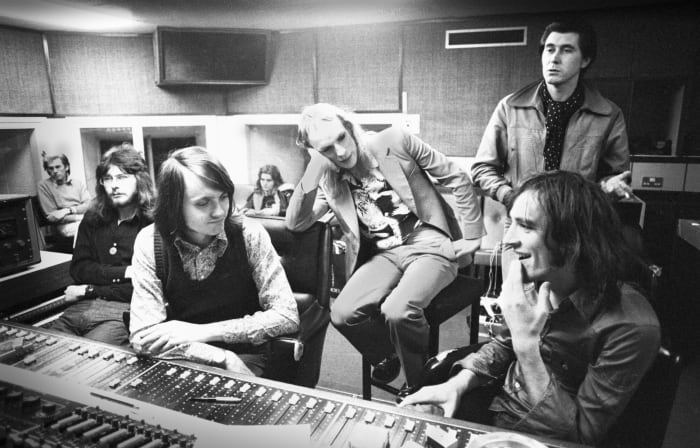
Looking through the photos in the imaginary Big Book of Rock History, you can probably spot Chris Thomas in the background of numerous shots. Yep, that's Chris there helping with the mixing of The White Album. Here's one of him mediating production conversations with Pink Floyd. Here he is producing albums by Procol Harum, Badfinger, and Roxy Music. He was a colorful, consistent producer, but when it came to Never Mind the Bollȯcks, the breakthrough album by snotty British innovators the Sex Pistols, all bets were off.
That record became a defining document in the history of punk music, but Thomas didn't slow down. Notoriously picky with which projects he picks up, he went on to man the boards for the first two Pretenders records, the star-making Kick by INXS, the heralded classic Different Class by Pulp, and numerous latter-day Elton John and Paul McCartney projects. While he's been in legacy caretaker mode over the last few years, overseeing numerous reissues and remasters of records he's worked on, Chris Thomas' daring insights have ensured that only the rarest acts could hope to "Kick" it with him.
Lee "Scratch" Perry
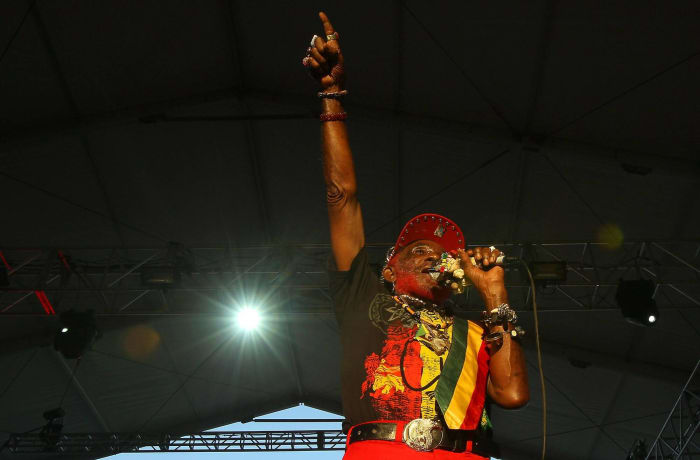
One of reggae music's greatest innovators and true eccentrics, Lee "Scratch" Perry is largely credited with popularizing the reggae "dub" style, which often overlapped new samples on existing recordings and then gave them a hallucinatory echo effect. He was an aide in helping shape the sound of Bob Marley & the Wailers, but his influence on the increasingly reggae-curious U.K. rockers The Clash helped boost his profile significantly.
While his work with his own band, the Upsetters, was powerful in its own right, he was beloved by rock musicians the world over. Paul & Linda McCartney recorded some songs at his legendary Black Ark studios, and The Rolling Stones' Keith Richards once referred to him as "the Salvador Dalí of music." While his curious habits like blowing marijuana smoke on the master tapes to "enhance" the sound only added to his legend, his passing in 2021 stunned the world. Even at age 85, Perry seemed like the kind of guy who would just be recording music forever. Thankfully, his incredible body of work will last for eons.
Teddy Park

Following Psy's breakthrough 2012 single "Gangnam Style", K-pop found greater acceptance in the Western world. Before long, groups like BTS and Blackpink would be topping charts, selling out stadiums, and getting honest-to-goodness radio play in the United States. While there are numerous production icons of the contemporary K-pop world like Yoo Young-jin, J. Y. Park, and Yoo Gun-Hyung, Teddy Park has lived through numerous waves of K-pop culture, from serving as the chief songwriter/producer of his rap group 1TYM to becoming the official in-house producer of the massive YG Entertainment label.
Since 1TYM folded, the notoriously camera-shy Teddy Park has served as one of the guiding forces of contemporary pop music, working on era-defining tracks for the likes of Big Bang, Sunmi, and G-Dragon. Yet his work with girl groups is nothing short of iconic, having produced all-timer hit "I Am the Best" for 2NE1 and virtually every major single by the record-breaking outfit Blackpink. He can do everything from acoustic ballads to frilly synthpop to stadium trap anthems, and his meticulous attention to structure and style has placed him on the cutting edge of pop music, even after decades in the game. YG Entertainment is often criticized for waiting too long between single releases, but given that virtually every song Teddy Park has touched in the last few years has gone on to net over a billion streams, Park is responsible for the current course of not just K-pop but the whole of pop music as we know it. He really is the best.
Max Martin

Max Martin is unstoppable. The Swedish producer-songwriter who started under the great pop songwriting tutelage of the late, great Denniz Pop got his start working on Ace of Base's sophomore album The Bridge. Yet the real surprise came when Martin was asked to work on the debut recording of an unknown singer going by the name Britney Spears, and their first collaboration, "...Baby One More Time" kicked off the teen pop explosion of the late-'90s and early 2000s. "As Long As You Love Me" by the Backstreet Boys? "I Want You Back" by *NSYNC? This was just the start of Max Martin's legacy, which would go on to him becoming arguably the most successful songwriter/producer of all time.
The secret to Martin's success was that he was always willing to change with the time, adding his spice and advice to any number of upstart artists. He has more hooks than a tackle shop and knows that simple and offbeat phrases are always better than wordy treatises when it comes to lyrics. This is why his legacy has endured through the decades, giving us iconic hits like "Since U Been Gone" by Kelly Clarkson, "I Kissed a Girl" by Katy Perry, "So What" by Pink, "Can't Stop the Feeling!" by Justin Timberlake, "Shake It Off" by Taylor Swift, "Blinding Lights" by The Weeknd, and too many other hits to count. Notoriously fame-adverse, Martin rarely gives out interviews or makes public appearances, but if your record needs a chart-topping, generation-defining single, hopefully, he can fit you into his busy schedule.
Jon Brion

A multi-instrumentalist singer-songwriter with a knack for bringing other artists to their full potential? Jon Brion, at one point, seemed to be the busiest man in music. After all, when not composing film scores (Eternal Sunshine of the Spotless Mind, Lady Bird) or working as a producer/collaborator in studio, Brion could be found as an in-demand session musician, laying trombone for one artist then tracking cello for another, and then being called in to play the marimba.
Yet when manning the boards, Jon Brion was best at bringing artists into their most classic eras, whether it be the first two albums by Fiona Apple or Aimee Mann's commercial peak era with the Magnolia soundtrack and Mann's critically lauded Bachelor No. 2. With Apple and Mann in particular, they developed a unique sonic language with Brion that other producers haven't been able to replicate or even imitate. When Brion was brought on to help co-produce and orchestrate Kanye West's epic sophomore album Late Registration (rife with Brion's unique orchestrations), his name shot into the stratosphere, earning critical laurels while securing his legacy. Add on his production work for Rufus Wainright, Frank Ocean, and dozens more, and Brion's status as one of the modern era's most eclectic producers is secured.
Nigel Godrich

Some producers are simply there to bring an artist's sonic vision to light. Others are brought in specifically to challenge the artist, push back against an artist's ideas, and make them change their sonic in radical new ways. Working as an engineer and sometimes producer for Radiohead during their The Bends era, Godrich's first proper full-length album produced was the band's landmark masterpiece OK Computer, which pulled off the tricky balancing act of making techno-paranoia sound like a classic rock record. And Godrich managed to do it in style.
He produced every Radiohead record since, and even when the group tried to get outside of their "comfort zone" and try a non-Godrich producer, the resulting sessions didn't click, forcing the group to bring Godrich back. The result? The legendary In Rainbows sessions. As Radiohead racked up critical hosannas, Godrich tried his hand working for other artists, forcing Paul McCartney to play all his own instruments again for 2005's brilliant Chaos and Creation in the Backyard and bringing Beck's lush heartbreak classic Sea Change to life. While Godrich has also manned the boards for Roger Waters, Arcade Fire, and every Thom Yorke side-project (The Smile, Atoms for Peace), Radiohead will always be his calling card — and for good reason. He's only one of the best rock producers ever to live.
Quincy Jones

While Quincy Jones is likely best known for his collaborations with Michael Jackson, his career as a performer and producer stretches to unfathomable lengths. A jazz trumpeter and conductor in the 1950s, Jones played on all ends of the spectrum. He produced records for Dizzy Gillespie one moment and Brill Building pop artists like Lesley Gore the next. While he was booked solid as an arranger for the likes of Ray Charles, Dinah Washington, and the Count Basie Orchestra, it was his game-changing work on Michael Jackson's grown-up solo album Off the Wall from 1979 that started one of the most successful producer-artist collaborations in the history of pop music.
With his extensive background, Jones could make the string sections in "Don't Stop 'Til You Get Enough" leap out the speakers while also milking the melodrama out of "She's Out of My Life" for all its worth. Polishing melodies until they are at their absolute brightest and catchiest, Jones brought Jackson's pop-disco sound to the forefront of the mainstream, as the duo's next two albums, 1982's Thriller and 1987's Bad, served as the template that all pop music was modeled after for the years that followed. Following Bad, Jones focused on signing acts for his own record label (Qwest) but largely remained out of the spotlight, content with having ushered some of the biggest pop songs to ever exist into this world.
The Bomb Squad
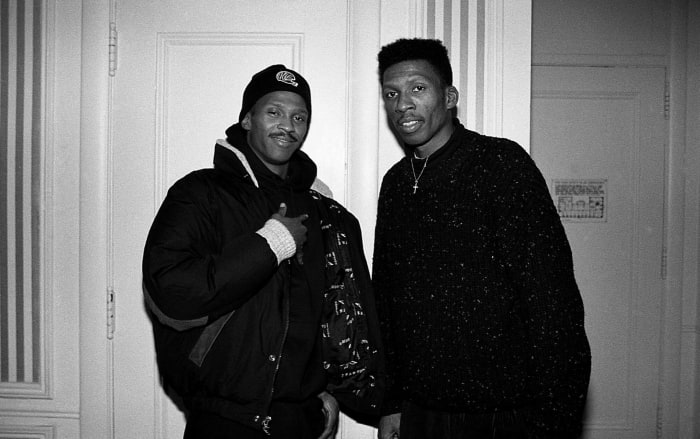
Paranoid, overstuffed, and even borderline atonal at times, the music of The Bomb Squad changed the game in terms of rap music production. That's because it was designed to. Featuring a plethora of members (including Public Enemy leader Chuck D himself) and led by Hank Shocklee, The Bomb Squad was conceived as a way to make Public Enemy stand out from their peers, upping the tempos and adding layers upon layers of samples to their soundscapes.
Is that a tea kettle being looped over pounding, gritty drum breaks, or a saxophone out of tune on Public Enemy's 1988 single "Rebel Without a Pause"? Love it or hate it, their unique creations stayed in your brain. The Bomb Squad sought to disrupt the rap landscape and did so in record time, making the debut albums of both Public Enemy and Ice Cube pop on the radio in a way few artists have since. While The Bomb Squad would later create tracks for Slick Rick, Bell Biv Devoe, and Run-D.M.C., they will forever be synonymous with Public Enemy, inspiring production outfits in their wake like OutKast's innovative collaborators Organized Noize.
Sam Phillips

Sometimes a music producer is a studio magician, pushing recording techniques to their limit to create sounds never heard before. Sometimes, a producer's might is established just by their power and bravery. Andy Warhol is the credited "producer" of The Velvet Underground's debut album, but all he did was cut the check for the studio time and used his influence to usher in this experimental art-rock outfit to the mainstream. In truth, Warhol is following in the footsteps of Sam Phillips, the man arguably responsible for the way rock music unfolded in history.
A former DJ who later opened up his own recording studio, Phillips knew his way around recording equipment but was best known for his anyone-welcome concept: he worked on stations that played both white and Black artists, later opened up his own female-run radio station, and had an open-door policy for amateurs who wanted to try their busking in front of a mic. Those newcomer acetates he pressed sometimes were sold to larger labels, and it's through Phillips' recording work and gumption that the world got to hear the sounds of Carl Perkins, Roy Orbison, Howlin' Wolf, and Jerry Lee Lewis. Yet his two biggest discoveries were a young upstart country singer named Johnny Cash and a teenager named Elvis Presley, both of whom had recordings that Phillips personally oversaw. It was from his to-the-point production style and ear for talent that pop music as we know it became what it is today.
Kenneth Gamble & Leon Huff

The classic "Philly Soul Sound"? Yeah, that's Gamble & Huff we're talking about. Kenny Gamble was born in Philadelphia, while Leon Huff was born in New Jersey. The two came together as musicians for a long-forgotten group called Candy & The Kisses. While Gamble was originally signed to Columbia Records as a solo artist, it soon became apparent that he and Huff had a natural chemistry for songwriting and producing, soon racking up enough hits for acts like The Intruders and The Soul Survivors to secure financing for their own label, Philadelphia International. Established in 1971. Gamble & Huff took over the '70s with their lush, orchestral sound, defining and playing into the emerging disco genre with perfect timing.
Their songcraft was peerless: "Love Train," "If You Don't Know Me By Now," and "Me and Mrs. Jones" all came out in 1972 alone. While The Jacksons were happy to borrow some of their cool (like with their 1976 single "Enjoy Yourself"), Philadelphia International spent a lot of time working on numerous albums for Lou Rawls, the O'Jays, and the great Teddy Pendergrass. While a payola scandal sidetracked them for a short spell, it was Teddy Pendergrass' 1982 car accident that left him paralyzed from the chest down, halting his career and putting Philadelphia International's future in doubt. Gamble and Huff kept recording, but the '80s were not as kind towards the Philly Soul Sound as the '70s were. Yet as the decades have passed, appreciation for Gamble & Huff has only increased, culminating with their 2008 induction into The Rock & Roll Hall of Fame.
Owen Bradley
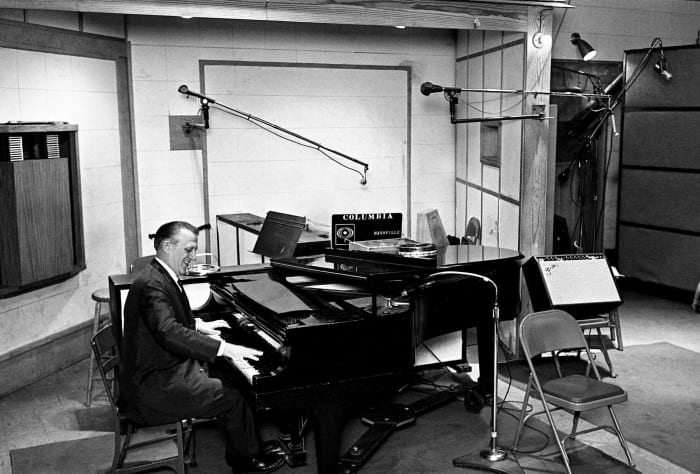
Before the arrival of Owen Bradley and Chet Atkins, country music recordings were largely considered "unsophisticated." While there could be dynamic banjo work on some barn-storming upbeat tracks, the production of these early country tracks did little to entice listeners unfamiliar with the sound or format. Bradley, Atkins, Don Law, and Bill Porter all arrived around the same time and brought some pop nuance to country recordings. As critic Stephen Thomas Erlewine put it, they were "using steel guitars and fiddles as flourishes instead of a foundation."
Bradley, born in Tennessee, quickly rose through the ranks to become the Vice President of Decca Records' own Nashville contingent, and if it was honky tonk or more traditional bluegrass, Bradley was happy to step in and man the boards. While his works with the likes of Conway Twitty was notable, it was his multi-year collaborations with artists like Patsy Cline and Loretta Lynn that showed how adept he was at bringing a pop influence to the country format. Tireless, Bradley was Loretta Lynn's chief music collaborator from 1963 to 1979, producing every single one of her albums, along with other crossover artists like Brenda Lee (and yes, that's Bradley bringing "Rockin' Around the Christmas Tree" to life). While some have decried Bradley's sophisticated pop approach as "countrypolitan," there's no denying that he helped bring giant new audiences into country music — altering the genre's trajectory forever.
Teo Macero
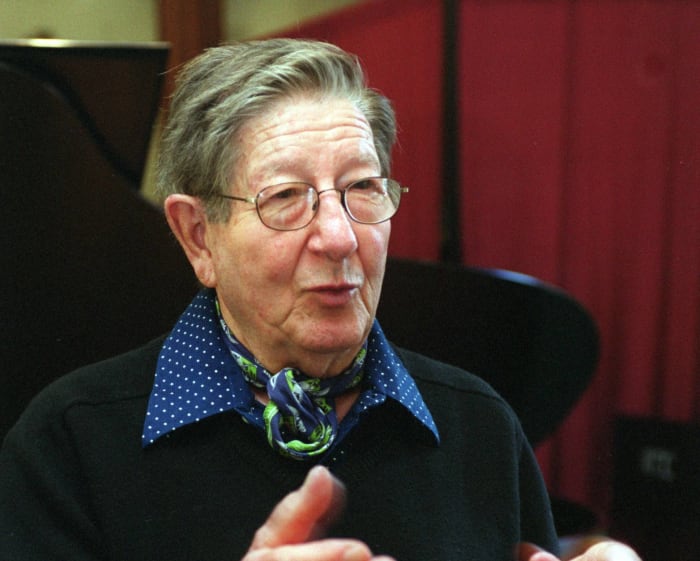
For a short spell, Teo Macreo tried to make it as a jazz musician. Having learned to play both the tenor and baritone saxophone, he would often be found jamming with his bass buddy Charles Mingus at the avant-garde Jazz Composers Workshop they helped set up in New York City. Initially brought in as a performer and arranger for Columbia Records, it wasn't long before he became involved in the jazz roster, lending his crisp ear to The Dave Brubeck Quartet's best-selling Time Out and producing the Columbia debuts for Thelonious Monk and his good pal Mingus.
While he would later go on to work in some folk and pop-rock contexts (notably recording Simon & Garfunkel's soundtrack album for 1968's The Graduate), it was his work with Miles Davis that changed history. Initially collaborating on 1959's Jazz Track, it was Macero who helped Davis come around to the "Third Stream" movement, which effectively tried to mix jazz and classical stylings. While their Sketches of Spain album is a landmark, their later jazz-fusion efforts garnered the most attention, with Macero editing the sessions of 1969's In a Silent Way into different forms, which at the time was considered jazz blasphemy. With 1970's legendary Bıtches Brew, Macero worked with Davis to cut, splice, loop, and add echo and reverb to the recording sessions — often taking the performance tape and manipulating it by hand to achieve certain effects. Their efforts helped push the envelope on what jazz could do as a genre, and in the half-century since its release, jazz music has never been the same.
DJ Premier

When Brooklyn's Gang Starr arrived in the late '80s, they sounded like no other East Coast rap outfit before. While rapper Guru managed to be conscious and sly at the same time, it was the beats of DJ Premier that elevated them above their contemporaries. Helping pioneer the emerging jazz-rap beat movement around the same that A Tribe Called Quest was making inroads, Premier laced his productions with the immediacy of a live DJ set — cutting from one piano sample to a delectable bassline with expert precision. It made the songs dynamic but also immediately and powerfully accessible. Their second and third albums, 1991's Step in the Arena and 1992's Daily Operation, became instant classics, and while the group never made the hugest commercial inroads, they commanded respect.
Premier soon started picking up other gigs, producing beats for legendary albums by Nas, The Notorious B.I.G., The Lady of Rage, Jay-Z, Rakim, and Mos Def. When he was asked to work on Christina Aguilera's 2006 "comeback" album Back to Basics, he was told by his hip-hop friends not to take the obvious paycheck gig. Ever the explorer, Premier pushed through, netting the biggest chart hit of his career while introducing himself to a whole new audience. As of this writing, he's still going at it, adding to his legacy with each new studio epic.
Prince

In the '80s, Prince emerged as a part of "the Minneapolis sound," where crisp drum machines laid the groundwork for a party in which funk, new wave, pop, and rock all intermingled into delicious, accessible, and sometimes experimental new forms. So while Prince had his band The Revolution, there were also girl groups like Vanity 6, funk-jazz outfits like The Family, exciting party-soul dynamos The Time, and the emerging rock percussionist virtuoso Sheila E. — all of whom had their albums and songs by and large written and produced by Prince.
One of the most prolific pop stars to ever exist, Prince Rogers Nelson was an ambitious multi-instrumentalist who apprenticed under local Minneapolis producer Chris Moon to make his debut album For You in 1978. Since then, he took over the boards and created thousands of songs, produced dozens of albums, and won Grammy Awards — and even an Oscar. His daring move to delete the bassline on his signature song "When Doves Cry" rewrote the way pop radio sounded, but that was only one of several experiments Prince did throughout his decades of dominance. An eccentric to some but beloved by many, few producers will ever match up to Prince's creativity, curiosity, or stunning instincts. He changed how music was made in the studio and on the stage.
Tommy LiPuma

Tommy LiPuma's bone infection saved his life. Not that anyone wants to have a bone infection, but as a child, his recovery from the ailment required him to be bedridden. To pass the time, he listened to the radio, wherein he fell deeply in love with jazz. He eventually learned to play the saxophone. Working in small-time label shipping departments at first, he soon moved into publishing, where he listened to many demos, including some early work by future stars like Randy Newman and Jackie DeShannon.
Soon, he took to producing, working on early hits for The O'Jays and the one-off smash "Guantanamera" for the Sandpipers. At that point, Tommy LiPuma went on a journey that led him to almost every major label and working with a galaxy of stars. Known for giving his warm touch to jazzy records, LiPuma made a name for himself working on classics like Barbra Streisand's The Way We Were, George Benson's acclaimed Breezin', and long-players from João Gilberto, Dr. John, Bill Evans, Al Jarreau, Miles Davis, Paul McCartney, and (curiously) Everything But the Girl. Yet his late-era was defined by his work with an aspiring jazz vocalist named Diana Krall, and he produced all of her full-lengths from 1995 to 2009. LiPuma wasn't one for much showboating or spotlight-hogging, but his work speaks for itself. LiPuma passed away in early 2017 at the age of 80.
Sylvia Robinson

Sylvia Robinson is often credited for being "The Mother of Hip-Hop." The label she co-founded with her husband, Sugar Hill Records, released both The Sugarhill Gang's "Rapper's Delight" as well as Grandmaster Flash and The Furious Five's "The Message," two songs often cited as being the foundation that rap music was built upon. Yet Robinson was so much more than just a label head: she was also a performer, guitarist, and producer all her own.
In the 1950s, she was a part of the duo Mickey & Sylvia, with their fluke hit "Love Is Strange" featured on the best-selling Dirty Dancing soundtrack from 1987. She played guitar on "It's Gonna Work Out Fine" by Ike & Tina Turner, released her own solo hit "Pillow Talk" (which she co-wrote and co-produced), and wrote and produced for other artists, including the 1970 hit "Love on a Two-Way Street" by The Moments. She had seen the music industry from just about every angle, but her willingness to take a chance on the emerging rap scene was a bold move that opened many doors for many people. She was a fearless leader, a knowing producer, and is rightly revered as a hip-hop pioneer.
Mike Dean

Mike Dean can play the saxophone. Also the bassoon. Also the keyboards, which came in handy when the teenage Dean became the musical director for Selena. When the young Tejano star's fame started to explode, disagreements with her manager-father led Dean to split and look into a new direction for his sound: beatmaking. Before long, he was in the Def Squad and later with Rap-A-Lot Records, helping guide the direction of Scarface's big '90s cuts. Dean then entered into a collaborative relationship with an upstart rapper-producer named Kanye West, playing on and co-producing tracks throughout the entirety of West's career. While he helped make songs like "Good Life" and "Stronger" turn into crossover smashes, it was Dean's work on a majority of the tracks off of West's opus My Beautiful Dark Twisted Fantasy that helped establish him as a generational talent. Also adept at mixing and mastering, Dean's fingerprints are over incredible records like West and Jay-Z's collaborative Watch the Throne, Frank Ocean's Blonde, Beyoncé's Lemonade, and even some latter-day Madonna LPs. It seems that with all of his iconic work, Mike Dean still has more peaks to climb, but only after he's done releasing his delightful series of marijuana-themed mixtapes.
Nile Rodgers

Nile Rodgers is one of the greatest disco musicians, but his brilliance as a creator extends far beyond the era of the mirrorball. While he produced his albums with his legendary disco outfit Chic, his distinct sense of separation and harmony, integrating string sections to his chugging rhythm guitar work and brisk percussion, was notable. (To say nothing of the gorgeous way he makes pianos and keyboards sound.) When Chic started turning out hits on the regular, Atlantic Records opened up their roster to him — allowing him to produce whomever he had an interest in. One of his first hits as a producer was "We Are Family" by Sister Sledge, and after that, it was off to the races: "Upside Down" and the legendary "I'm Coming Out" by Diana Ross, the plastic funk heel-turn that was "Let's Dance" by David Bowie, and then a vast majority of Madonna's breakthrough 1984 record Like a Virgin, leaving his mark on hits like "Material Girl" and the immortal title track.
He was a producer recognized not just for his guitar-playing but also for the "sound" of his productions, which was always notably distinct shine and always went down smooth. While his credit as a guest on Daft Punk's immortal "Get Lucky" helped bring him back into the world spotlight, a quick shoutout needs to go to some of his more underappreciated productions for The B-52's, giving singles like the stunning "Deadbeat Club" some real studio wow factor.
Gary Katz

While Gary Katz played all angles of the music industry, from mastering to A&R to even some vocal assists now and then, he is best known for producing one band: Steely Dan. While Katz also has credits with the likes of Laura Nyro, Joe Cocker, and had a mismatched collaboration with Diana Ross, Katz is forever synonymous with the jazz-rock duo of Walter Becker and Donald Fagen.
Serving as the producer on every album from the Dan's classic era (see: 1972's Can't Buy a Thrill through 1980's Gaucho), Katz helped polish the group's sound to perfection, splicing in cuts from numerous contributing musicians to Becker and Fagen's complex arrangements. Yet Steely Dan albums are a rare breed, fetishized by audiophiles worldwide for just how immaculate the studio craft is. Every instrument is given a warm glow, not a single sound out of place. Some people even use Steely Dan albums to test sound systems, ensuring speakers can capture every range of sound possible, as so expertly showcased by Katz and engineer Roger Nichols. Katz was even nominated for the Producer of the Year Grammy in 1983. While Katz has done much for the music industry outside of his production, his meticulous precision has enshrined him as one of the most distinctive producers ever.
RZA

In the world of hardcore hip-hop, few groups stood out like the Wu-Tang Clan. While the group is stacked with all-time great rappers like Raekwon, Method Man, Ol' Dirty Bāstard, Ghostface Killah, and Inspectah Deck, Wu-Tang managed to cut through the rap radio soundscape due to Bobby Digital's (a.k.a. RZA) dynamic productions. Never one to turn down a sample he didn't like, RZA became notorious for speeding up and pitch-shifting old recordings to get a new emotional timbre over his booming snare thuds. Before long, a new generation of producers like Kanye West and Just Blaze were making their own variants of his style.
While RZA continues to produce to this day, it's his run in the mid-'90s that saw him hungry, creating unnerving, beautiful, and downright cinematic beats that helped define the careers of his many collaborators. Interspersing his dark melodies with dialogue clips from films, his early work with Wu-Tang is perhaps only rivaled by his production with the horrorcore fantasies of the Gravediggaz, Method Man's Tical, and of course, the debut solo outings from both GZA and Raekwon, which are often in the discussion of not just the most beloved Wu-Tang offshoot records, but some of the best rap albums ever made.
Butch Vig

In the late '70s, the Madison, Wisconsin-based Butch Vig passed his time absorbing everything rock music had to offer him. He formed the band Spooner, did scores for small-time shlock films, and started dabbling in music production after one of his many side-projects landed a major label deal that ultimately didn't go anywhere. Lending his talents to many hard rock and post-hardcore acts throughout the '80s, he started honing in on how to make even the harshest guitar tones sound inviting and accessible. This was all good practice because when he produced the debut album by The Smashing Pumpkins and the sophomore record for an upcoming grunge outfit called Nirvana, little did he know that he'd be standing on the precipice of rock history.
The Pumpkins' Gish became a generational goth-rock classic, while Nirvana's Nevermind went supernova, effectively killing the entirety of '80s hair metal and changing the direction of pop music forever. Vig could've easily retired at that point and still ended up on this list, but his ongoing work with the Foo Fighters, AFI, Green Day, and Against Me! has proven his relevance, to say nothing of his own successful band, Garbage. Even the most casual rock music fans have unquestionably heard at least one song produced by Butch Vig. In reality, they've probably heard several.
Steve Lillywhite

You know you've achieved producer-god status when your name becomes the title of one of the most popular bootlegs of all time. Steve Lillywhite, regarded as one of the finest British new wave and rock producers of his generation, ran into that exact issue when it came to Dave Matthews Band's The Lillywhite Sessions. Having produced some of DMB's most heralded and popular albums throughout the '90s, a collection of sadder songs was percolating in the new sessions, which the band later scrapped in favor of working with Alanis Morissette confidant Glen Ballard, resulting in the widely derided pop detour that was 2001's Everyday. The lead of The Lillywhite Sessions became fan favorites of the early file-sharing era (and were later re-recorded for the Matthews album Busted Stuff), but Lillywhite's legacy was secure far before that.
Initially a signed producer to Island Records, Lillywhite managed to helm the debut recordings for iconic acts like Ultravox, Siouxsie & the Banshees, and the Psychedelic Furs. Transforming the quirky art-rock of XTC into U.K. radio hits upped his profile, soon leading to him producing albums for Peter Gabriel, the Rolling Stones, Talking Heads, and the first three records by a little upstart Irish act called U2. Toss in some work for the Pogues, Kirsty MacColl, and Phish, and you have one of the most eclectic discographies of any working producer today.
Jimmy Page

Jimmy Page is very selfish. He couldn't simply be regarded as one of the finest rock guitarists ever to live, no: he also had to be a heralded songwriter and acclaimed producer to boot, hogging all the acclaim for himself! All joking aside, former skiffle-bred guitarist Jimmy Page had seen so much of the music industry well before forming Led Zeppelin, having honed his craft being an in-demand session musician, having played on tracks for groups like The Who and The Kinks. With his reputation on the rise after performing on de facto hits like Petula Clark's "Downtown" and Shirley Bassey's "Goldfinger," he became both a producer and an A&R man for Immediate Records, testing out some production experiments with The Yardbirds that would later come in useful when it came to the Zep.
Changing engineers between albums (as Page said he wanted credit for his sounds), Page bucked tradition by refusing to do expected things like putting guitar mics directly in front of guitar amps, instead setting them far away to capture the delay and tones of the room he was recording in. He would flip over tapes and re-record over them to get certain echo effects, adding that extra bit of weirdness and psych-effect nuance when needed. The technique was something he got even more comfortable with over time, bringing in string sections and some unexpected instruments. An obsessive who ultimately spent so much time on Zep's output and legacy he barely produced others after his reign, being a part of one of the most iconic rock bands ever to exist was in no small part due to his incredible ear for how a rock record should breathe.
Teddy Riley

Teddy Riley may not have invented New Jack Swing, but he certainly popularized it. That hard-hitting pop-R&B sound of metallic drum machines and orchestral hit synths became the template that much of late-'80s pop music became based on, largely due to Riley's heavy involvement with many rap greats in the era. Having churned out platinum hits with his vocal group Guy, Riley honed on his signature sound by working on albums for the likes of Keith Sweat, Bobby Brown, Kool Moe Dee, and the legendary Heavy D & The Boyz.
It was enough to net him the attention of Michael Jackson, who had Riley work on several tracks on his 1991 blockbuster Dangerous, including singles "Remember the Time," "In the Closet," and "Jam." Soon thereafter, Riley would form Blackstreet, who broke through in a big way with 1996's massive chart-topper "No Diggity" featuring Dr. Dre and Queen Pen. Since then, Riley has evolved his signature sound to fit with K-pop, penning songs for groups like SHINee, EXO, and the legendary Girls' Generation hit "The Boys." His output has slowed considerably in the 2010s and 2020s, but a one-off Lady Gaga credit and hanging around for some production work on Mary J. Blige albums feels more like true and proper victory lap behavior than anything else.
Kanye West

Kanye West entered the 2000s as a complete unknown, started the 2010s as one of the defining artists of his generation, and began the 2020s as a pop culture pariah. Yet when he was in his prime, Kanye delivered maximalism to rap production, flipping creative samples and introducing a new degree or ornate musicality to a genre always thirsty for innovation. Launching himself with his beat for Jay-Z's "Izzo (H.O.V.A.)," which featured a cut-up and invigorating portion of the Jackson 5's "I Want You Back," West quickly established himself as a hot new producer. He soon linked up for hot new tracks by Mos Def, Talib Kweli, and his good friend Common.
His 2003 solo single "Through the Wire" was clever, but his albums were striking pieces of ambition, growing bolder and daring with each iteration. While his 2010 effort My Beautiful Dark Twisted Fantasy was heralded as one of the greatest rap albums of the decade, his efforts since then have been bracing, unwieldy, and clearly unfinished. Even through his many controversies, he continues to produce for a select few non-Kanye artists, such as Nas and Pusha T, while still tinkering on whatever strange new thing his muse has guided him to. While Kanye West is unquestionably a polarizing figure, his game-changing approach to rap production has ensured his legacy will continue to endure almost in spite of himself.
Todd Rundgren

Todd "The God" Rundgren has been playing by his own rules for years. Recording an album where his voice is used as every single instrument (1985's A Cappella)? Sure! Forming a prog-rock group with three synth players (Utopia)? Why not! The Philadelphia-born polymath could play a seemingly infinite number of instruments, and with his ability to conjure any sonic wish he wants as his own producer, it's no surprise his solo albums remain strange, often insular affairs.
Yet Rundgren always had a knack for a pop song, and tracks like "I Saw the Light" and "Hello It's Me" (both from his 1972 masterpiece Something/Anything?) danced with Carole King-styled piano-pop sensibilities. Refusing to be cornered into one box, Rundgren lent out his sharp sonic skills to like-minded friends, working on quirk-rock outfit Sparks' "pre-" debut album Halfnelson, letting Meat Loaf hit operatic heights on his seminal Bat Out of Hell, and even pushing English art-rockers XTC to their critical zenith with 1986's Skylarking. In his later years, Rundgren keeps being unabashedly himself, trying his hand at techno music and collaborating with everyone from Weezer's Rivers Cuomo to Trent Reznor to Robyn. In the studio, he really is a wizard.
Ariel Rechtshaid

Not every day does a ska band member become one of the most heralded musicians of his generation, but not everyone can be Ariel Rechtshaid. Forming the ska group The Hippos in 1995, his band was just a little too late to ride the ska wave, which soon led to Rechtshaid quitting and focusing on producing and writing for commercials. His production on a fluke acoustic chart-topper (Plain White T's "Hey There Delilah" from 2006) got the industry's attention, and before long, he became the indie producer du jour.
"Everything Is Embarrassing" by Sky Ferreira was a blog-house smash, Haim's debut album was a breakthrough success, and his deft handling of the wild sounds of prime Vampire Weekend has netted him Grammy Awards. Nowadays, Rechsthaid is working with Beyoncé, Charli XCX, U2, and Adele — already in the upper crust of the production world, simply because he can take either a simple melody or total instrumental chaos and streamline it into a sleek, bright package the way that few producers can. Even as one of the younger producers on this list, it's clear that Rechtshaid will only hit higher heights from here on out.
Phil Spector

As influential as he was infamous, no list of the all-time greatest producers could exist without the inclusion of Phil Spector. An ambitious young man who owned his first record label when he turned 21, Phil Spector became famous for his "Wall of Sound" production approach, condensing waves of instruments and orchestrations into an overwhelming swarm of pure sonic. The effect was dramatic, cathartic, and arguably even operatic. A vocalist, arranger, songwriter, and producer, Spector quickly became known for his inflated ego and hot temper as much as his indisputable hit-making track record.
The Crystals, The Ronettes, The Righteous Brothers, Ike & Tina Turner — these were just a few of the musicians that became a part of Phil Spector's ever-increasing money-making machine. Sometimes even songs that didn't become hits, like Ike & Tina Turner's revolutionary "River Deep – Mountain High," would later become heralded as some of the finest pop recordings ever made. While his orchestral overdubs to The Beatles' final album Let It Be remains the topic of much debate, Spector managed to ingratiate himself with enough of the Fab Four to become a go-to collaborator for the early solo recordings of both George Harrison and John Lennon. Becoming largely inactive from the '80s onwards and later tried and convicted for murder, Spector's legacy has largely been in flux, even as his pioneering work in the '60s is nothing short of undeniable.
Trevor Horn

A fun bit of bar trivia is knowing what the first music video ever shown on MTV was. The answer, of course, is the one-hit-wonder single "Video Killed the Radio Star" by The Buggles -— a perfect song for a generational moment. Whatever happened to that group? As it turns out, one of those band members, Trevor Horn, had a real knack for recording, even calling The Buggles' overambitious sophomore album Adventures in Modern Recording. The band didn't work out, but Horn did, soon joining prog-rock outfit Yes as their singer before later stepping back to a producer role when Jon Anderson returned.
Horn's work on their seminal record 90125 resulted in the band scoring their only chart-topper: "Owner of a Lonely Heart," a tune which lives and dies by its colorful, multi-layered production. After that, Horn became so in-demand that he gave his talents to anyone who interested him: Frankie Goes to Hollywood (during which Horn helped make "Relax," a planet-swallowing hit), Grace Jones, Pet Shop Boys, Seal, Rod Stewart, LeAnn Rimes, Belle and Sebastian, and even one-off hitmakers t.A.T.u. ("All the Things She Said"). His ever-eclectic love of sound has informed decades of rock and pop music, so it's no wonder that when U.K. pop megastar Robbie Williams had him produce his 2009 full-length, the resulting record was titled in Horn's honor: Reality Killed the Video Star.
Babyface
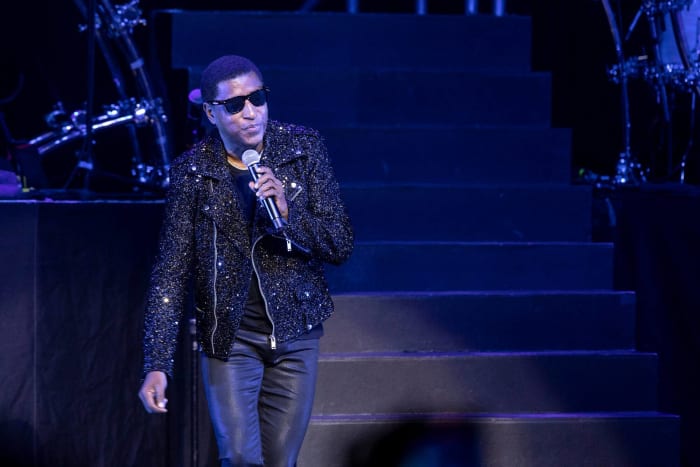
When the talented young musician Kenneth Edmonds got to meet one of his idols in Bootsy Collins, it was Collins who said he had a "Babyface" — and the name stuck. When Edmonds met up with Antonio "L.A." Reid for their pop-R&B group The Deele, a songwriting partnership was formed, and before long, the duo was producing for acts like Bobby Brown and Sheena Easton. While Babyface tried his hand at a solo career, his cool soul sound got noticed by Whitney Houston's team, who at the time was facing a credibility crisis. The more New Jack Swing-centered "I'm Your Baby Tonight" went to No. 1, as did his collaboration with Madonna, "Take a Bow."
While Babyface would continue working with Houston (his "Queen of the Night" appeared on The Bodyguard soundtrack), it was his blockbuster success writing and producing Boyz II Men that shot his profile into the upper echelon of music makers. Around this time, Babyface and Reid made their own LaFace Records imprint, which quickly found success with newly signed acts TLC, Toni Braxton, Pink, and Ciara. Babyface's strength has always been letting his sound evolve with the times, even while being true to himself. His ear for a smooth track rivals his ear for new talent, and while he's spending more time working on his solo albums than producing for others, it's clear that Babyface's reign as an all-time producer is far from the end of the road.
Jimmy Miller
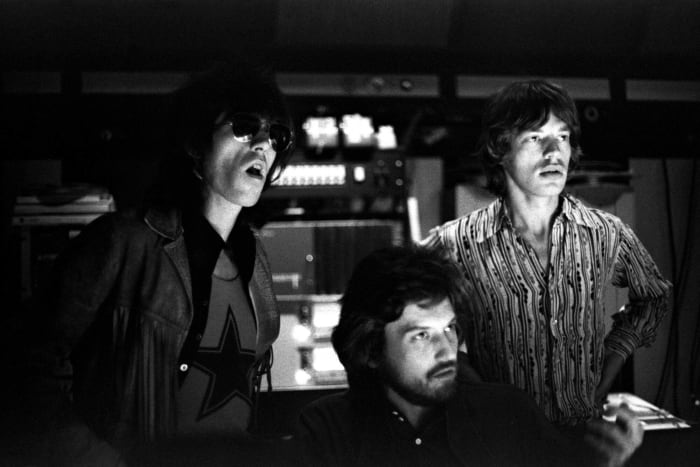
For a while, Jimmy Miller had a plum gig as Steve Winwood's co-conspirator. A songwriter who turned into a producer, it was Steve Winwood's remix of the Spencer Davis Group single "Gimme Some Lovin'" that earned him his initial notices, soon taking helm at the booth for Winwood's band Traffic and the one-off supergroup that was Blind Faith. It became clear that Miller had a knack for recording percussion, making snare hits, tom thuds, and bongos pop out in the final mix in a way few producers were able to before.
This work helped Miller land in the orbit of The Rolling Stones, and his run with the group, from 1968's Beggars Banquet to 1973's Goats Head Soup, is arguably the most acclaimed period of the band's career. Miller helped bring the bongos on "Sympathy for the Devil" to the foreground, cementing the song as an instant classic. Miller was there right as the group was starting to expand their sound, and it was Miller who guided them from kitschy country numbers to serious ones, as the dramatic sweep of "Wild Horses" is what helps make it an all-timer. Miller worked with other acts like Motörhead in his post-Stones era, capping his career with Primal Scream's deeply Stones-indebted 1991 classic Screamadelica before his passing in 1994.
Daniel Lanois
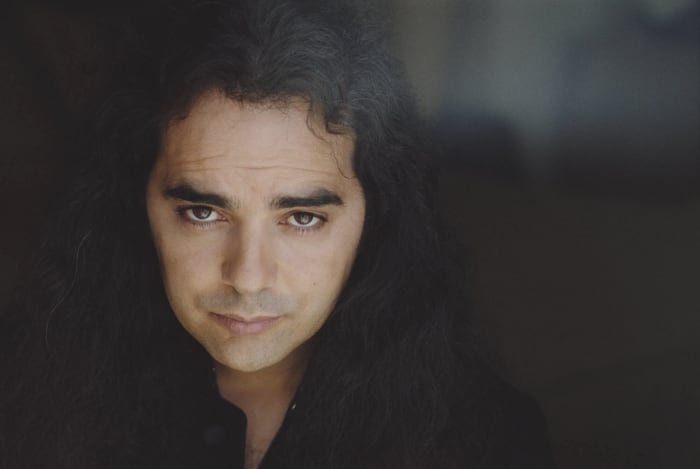
If you need an easy way to remember how to pronounce Daniel Lanois' last name, simply recall the album title that Neil Young came up with when they collaborated in 2010: Le Noise. The Quebec native has come a long way since offering to produce his friends' albums for $60 in the laundry room of his house. Initially working as a songwriting/producing duo with his brother Robert, those laundry sessions soon led the duo to upgrade to larger studios, wherein they held sessions with the likes of Raffi and eventually met up with a guy named Brian Eno. Lanois and Eno immediately hit it off, soon forming a nearly unstoppable partnership that included numerous forays into ambient music.
It was Eno who insisted Lanois help man the boards for U2's album The Unforgettable Fire, which became a massive hit. This soon led to Lanois falling in with Peter Gabriel, and Lanois' genre-bending work on the record So launched Gabriel into the spotlight with hits like "Sledgehammer" and "In Your Eyes." Lanois was never a studio perfectionist, often enjoying the warm tone of a room sound over records with so much studio polish there was no emotion left. It's this attention to performance that also got him involved with Bob Dylan, and their collaborative "comeback" album Time Out of Mind earned an Album of the Year statue at the Grammys — one of three Lanois owns. Never taking a linear path with his career, Lanois also did the soundtrack for the video game blockbuster Red Dead Redemption II, introducing his songwriting and aesthetics to a whole new generation of listeners.
Dave Cobb
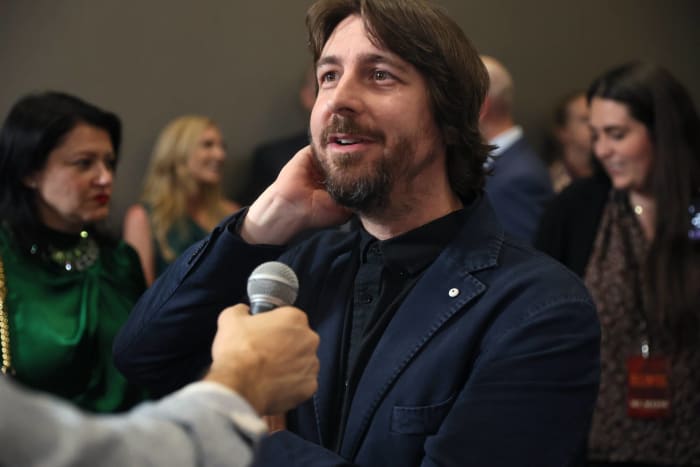
When Garth Brooks and Shania Twain helped push country music into the arena-pop realm during the '90s, little did they know that they would accidentally create "Nash Vegas," a very boorish, obvious, and pop-friendly variant of country that ushered in superstars like Luke Bryan, Florida-Georgia Line, and Morgan Wallen. They all sold in the millions, but country purists craved something more: something modern that wasn't necessarily rooted in reverent traditionalism. Enter Dave Cobb: a Georgia boy raised in a Pentecostal church who learned how to play all his instruments during Sunday services. A rough stint in a band allowed him to at least learn how to produce records, and a handy connection to Shooter Jennings soon led him to work with the legendary Oak Ridge Boys. Cobb endeared himself to outlaw artists like Jamey Johnson and acclaimed songwriters like Jason Isbell, soon leading him to work with up-and-coming talents like Sturgill Simpson, whose notably unconventional Metamodern Sounds in Country Music broke through in a big way.
Often shying away from the latest studio technology in favor of analog equipment, Cobb quickly became associated not only with a raw, urgent sound in country music. His mere presence served as a stamp of approval, signifying the defiant and beautiful alternative to the Nash Vegas conveyor belt. When Chris Stapleton's Traveller proved a crossover success, it was partly due to the behind-the-scenes songwriter finally unleashing great songs he was hoarding in tandem with Cobb's acute ear to bring that outlaw sound to glorious life. Nowadays, Cobb is manning the boards for Lake Street Dive, Brandi Carlile, and even Lady Gaga's "Always Remember Us This Way" from her A Star is Born soundtrack. Cobb truly is the meta-modern sound of country music right now.
Martin Hannett

The Manchester-born-and-bred Martin Hannett died at the too-young age of 42, succumbing to substance abuse issues following a wild run through the indie music scene. Playing bass in his own bands and having worked the soundboard of numerous live gigs, it wasn't long before Hannett found himself in the studio. After producing Buzzcock's seminal 1977 Spiral Scratch EP, he became a founding member of the legendary independent label Factory Records, following ho-hum success with his punk imprint Rabid Records. His first big assignment was working with Joy Division, a deeply dark post-rock outfit that was aiming for a gritty and alienating sound. Hannett was a taskmaster in the studio, initially thinking a drum machine could be tighter than any actual working drummer until Stephen Morris proved the notion wrong. Their first collaboration together, the debut full-length Unknown Pleasures became one of the most essential rock albums in history, as Hannett managed to take the band's dexterous musicianship and Ian Curtis' paranoid vocals in a staggering, stark, and beautiful context.
Hannett's run with Joy Division was legendary, but after Curtis took his own life, Hannett had to pull out of several gigs, including producing U2's debut album. (He did manage to work on their first international single, however, which sounds so angular and Factory-inspired in retrospect.) Hannett continued to work with acts like The Happy Mondays and Magazines in his later years, but even with his tragic passing, his sense of sonic helped alter the course of rock music, showing the world the real beauty that could be found in the dark, the gritty, and the grim.
Timbaland
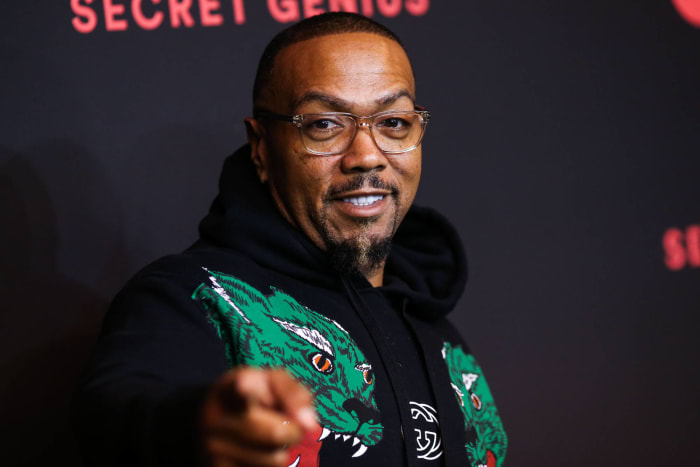
For about two decades, Timbaland defied the very notion of what pop music could do. While his work on Ginuwine's debut album led to the breakthrough success of the song "Pony," his frequent collaborations with Missy Elliott had the two unraveling every preconceived notion of what rap music could even sound like. Elliott's 2001 single "Get Ur Freak On" was like nothing else on the radio, and around that time, his beat for Aaliyah's "We Need a Resolution" used its sax sample and stuttering production to create R&B that got called "futuristic" (a frequent descriptor of Tim Mosley's envelope-pushing creations).
Following his work with Justin Timberlake on defining singles like "Cry Me a River" and "SexyBack," it felt like Timbaland had found an incredible sweet spot between top-40 acceptance and pure experimental insanity. After using his clout to change the career trajectory of Nelly Furtado and give OneRepublic their big break, Timbaland spent most of the late 2010s as more of an elder statesman of pop music, forming the Verzuz performance show and working with new up-and-coming talent, but no matter: rap, pop, and soul music got a whole lot weirder due to Timbaland's involvement. (For our money? The ping-pong table beat to the 50 Cent single "Ayo Technology" is one of his best.)
Madlib

The best part about a Madlib production is that his work will surprise you no matter what part of his discography you're exploring. An adept DJ and sampler who can reorient the most obscure clips into strange new shapes, he's tried his hand at beat-driven jazz, commercial rap numbers, and collaborations with a shortlist of the finest backpack rappers and DJs to ever record. While the Oxnard-born Otis Jackson Jr. got his start working with the rap group Tha Alkaholiks, it was when he got signed to the legendary crate-digging record label Stones Throw that he found his calling, crafting jazz albums, rap albums, and anything else his mind could think of. Samples would appear one moment and then drop the next, beats would change on a dime to match a dexterous flow, and instruments would sometimes deliberately not stay on rhythm. These were the types of always-engaging soundscapes Madlib could muster.
Madvillain, his collaborative act with MF Doom, unleashed one of the most humorous, revered, and analyzed rap albums of the young century with 2004's Madvillainy, showing Madlib just how large an audience he could reach. He's the rare producer who never really has a slow period, largely because all of his efforts were put into projects that he loved regardless of their commercial potential, even if he's ended up with credits for Erykah Badu, Kanye West, and Snoop Dogg. Yet even when he's called in to work on a Black Star record, Madlib's more eccentric projects (and personas) are where he shines. Despite not being one to find his songs in the Top 40, Madlib's influence on rap music is immense. No one has even tried to copy his style. A Madlib beat sounds only like Madlib.
Pharrell Williams
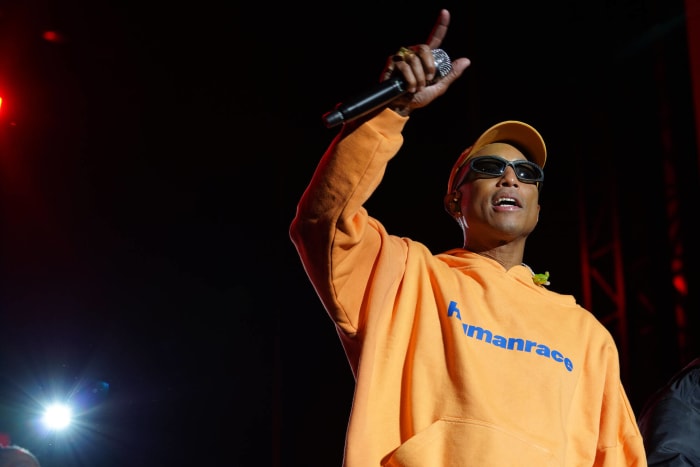
Timbaland and Teddy Riley, other famed sonic titans on this list, were on the ground with Virginia Beach native Pharrell Williams when he was getting his start with his production duo The Neptunes. Along with Chad Hugo, the two had a specific brand of sparse, alien funk that they would use to create some daring, impossibly catchy rap productions. While Wreckx-N-Effect's "Rump Shaker" and Ol' Dirty Bāstard's "Got Your Money" got attention, their work on Mystikal's "Shake Ya A--" was when they started developing a signature sound — soon being booked to work with Jay-Z, Britney Spears, and Kelis.
Creating the band N.E.R.D. to make their own hits, Pharrell's funky, sometimes astonishingly stripped-down style created an immediacy that most other producers would overcomplicate. When asked to do the music for the Despicable Me 2 soundtrack, Pharrell scored a global smash with the lithe and bubbly "Happy," proving he could do straight-ahead pop just as easily as he could create next-generation rap beats. Pharrell is so prolific that his reputation can take a hit even after a few, let's say, "controversial" productions, but in 2022, he proved that over two decades into the game, he's still got the sauce. He cracked the Top 40 with "Cash In, Cash Out," a stunning number that uses a drum machine, bass synth, and single sample to create one of the hardest rap tracks of that year. He's got to be "Happy" about that.
Rick Rubin

Smash-cut to any decade of Rick Rubin's life, and he's probably wandering close to the cultural zeitgeist. In the '80s, he and his friend Russell Simmons founded Def Jam Records, which famously operated out of Rubin's dorm room. His fuzzy, often rock-oriented production changed rap music's sonic lexicon, and his productions for LL Cool J, Run-DMC, and a new group of New York City white boys named the Beastie Boys made Rubin a star. In the '90s, he helped the Red Hot Chili Peppers find their half-party/half-journeyman sound and hung out with Mick Jagger. He formed another label, American Recordings, and became obsessed with giving washed-up legends another shot at success, working on serious comebacks for Donovan, Neil Diamond, and Johnny Cash.
In the 2000s, Cash's cover of Nine Inch Nails' "Hurt" became a cultural moment, and his work on Jay-Z's single "99 Problems" was legendary. Rubin was less known for his specific production techniques so much as for his iconography, taking on a svengali role and challenging artists to push beyond their limits. He helped the Dixie Chicks — now known as The Chicks — stage their critical comeback with 2006's Taking the Long Way and gave Metallica new life with 2008's Death Magnetic. He started the 2010s by working on several tracks off of Adele's 21, and only continued to maintain his relevance by working with Linkin Park, Eminem, and Ed Sheeran. While some have characterized his latter-day productions as "colorless," especially when it comes to his rock albums, Rubin has redefined what it means to be a super-producer time and time again.
T-Bone Burnett

For the longest time, T-Bone Burnett wanted to be a solo artist. Born in St. Louis, he loved jazz, blues, and country music as a youth and even managed to self-produce his first solo album before getting wrapped up as a touring guitarist for Bob Dylan in the '70s. After a few more failed stabs at stardom, he pivoted to being an in-house producer and quickly earned a name for honing in on the signature sound for roots-based acts. He was at ground zero for the careers of Los Lobos and the BoDeans, and quickly became a confidant for Elvis Costello and Sam Phillips.
Working on breakthrough albums for the Counting Crows and The Wallflowers boosted his commercial prospects, while the pitch-perfect tones he achieved for Gillian Welch's solo career helped her quickly become a critical favorite. Yet when the Coen brothers approached Burnett to help develop the soundtrack for O Brother, Where Art Thou?, which had a heavy bluegrass and Americana slant, he took the task to heart, mining the Alan Lomax archives while also recording new songs with a plethora of genre artists — resulting in not only a surprise mega-hit but also a record that would win the Grammy for Album of the Year. Following another win in the same category for his Robert Plant and Alison Krauss collaboration Raising Sand, Burnett could write his own check, pumping out solo albums and working with any artist he chose. While many peg Burnett as the go-to helmer of rustic sounds, his body of work is warmer and wilder than most people think.
Tony Visconti
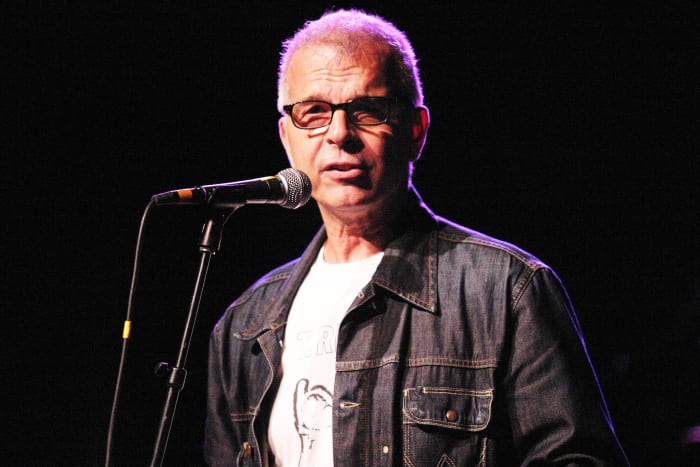
When T. Rex first started making music, they were as hippy-dippy a psych-rock outfit as you could imagine. Yet over time, with the help of New York City-born producer Tony Visconti, the group would become glam rock kingpins, with Visconti aiding their transition and ultimately helping songs like "Bang a Gong (Get It On)" and "20th Century Boy" become radio staples. As T. Rex evolved, so did another collaborator of Visconti's: David Bowie. The Thin White Duke didn't even go by that name when Visconti helped produce early hits like "The Man Who Sold the World," but Visconti stayed with Bowie for several years, adapting his production techniques to match whatever genre experiments Ziggy Stardust wanted to try next. This led to breakthrough albums like the "plastic soul" sound of Young Americans and the famously experimental "Berlin trilogy" of albums.
To make the vision of an auteur like Bowie come to life requires real skill, and before long, acts like Badfinger, Thin Lizzy, Sparks, Morrissey, and the Moody Blues all hired Visconti, often with the specific aim of formulating big comebacks after years of subpar material sunk their fortunes. Although Bowie cut ties with Visconti in the '80s, they reunited in the 2000s, leading to some surprisingly spry late-period material. Their final collaboration ended up being Bowie's final album, as Bowie passed away two days after the release of 2016's Blackstar. Suddenly seen as a secretly constructed final farewell as he privately struggled with liver cancer, the jazzy, arty, experimental, and ultimately heart-rendering Blackstar was considered a masterpiece and became Bowie's first album to top the charts in America. No wonder he trusted his confidant Visconti with such a delicate task.
Dust Brothers

When the legendary U.K. dance duo The Chemical Brothers started making music in the early '90s, they called themselves The Dust Brothers in tribute to the American production duo they revered so much. Of course, as they became popular, they had to legally change their name, but they adored Mike Simpson and John King because few artists sounded remotely like them. While early production for rappers like Tone Lōc and Young MC got the Dust Brothers noticed for their colorful sound and unusual use of space in their beats, it was the Beastie Boys, at the time an extremely hot commodity, who became deeply attracted to their sound.
While their collaborative record Paul's Boutique flopped for sounding nothing like the Beastie's frat-rap debut, the album was a slow-burn discovery; the dense rhymes and wild use of samples (then cleared for minuscule rates) redefined the possibilities of rap music, influencing an entire generation of rap producers like Prince Paul and J Dilla. The Dust Brothers then got involved with Beck, helping shape the eclectic, shifting sounds of iconic records like Odelay and Midnight Vultures. Ever-selective with who they work with, they surprised many by helming the debut single for the brotherly pop-rock trio Hanson ("MMMBop"), and then crafted the wild and atypical score for David Fincher's film Fight Club. The duo often produced solo in the 2000s, but came together to work on songs by Linkin Park and albums by They Might Be Giants and Tenacious D, showing that for being as genre-busting as they were, they truly didn't have any limits.
Jam & Lewis

Being fired by Prince was the best thing to happen to Jimmy Jam & Terry Lewis. While the songwriting/production duo were doing just fine performing in the Prince-dictated band The Time, Jam & Lewis being late to a gig forced Prince to let them go, thereby freeing them up to continue work with artists like the S.O.S. Band and Cheryl Lynn. While their sound was somewhat similar to Prince's, they refined their style into a distinct shape: lively drum machines, hard-hitting synths, and a dynamic sense of melody were all hallmarks of a great Jam & Lewis production. While the duo was successful, their skills were a custom fit for Janet Jackson, the youngest Jackson sibling who wanted to make a career after releasing two paltry albums made under her name with no artistic input.
Starting with 1986's Control, Jam & Lewis build bridges between urban radio and the Top 40, experimenting with Janet to deliver all-time hits like "What Have You Done For Me Lately?", "Rhythm Nation," "Miss You Much," "That's the Way Love Goes," and so many more. While the duo was happy to flex their muscles with other artists in other genres (scoring chart-toppers with The Human League's "Human," George Michael's "Monkey," Boyz II Men's "On Bended Knee," and Usher's "U Remind Me"), it is their close ties to Janet that they will always be synonymous with, even producing her collaborative track with brother Michael "Scream." When the duo reunited with Janet for a new album in 2015, Jam & Lewis showed that they were unafraid to change their sound to match the musical moment, making a "classic" Janet album that didn't sound remotely dated. They will always be responsible for one of history's most successful producer-artist relationships.
Jerry Wexler and Arif Mardin

Wexler was a music journalist who coined the term "Rhythm & Blues," which his employer Billboard used to update some deeply-dated names for Black music charts. Mardin was born in Turkey and had a deep love of jazz music following a chance encounter with Dizzy Gillespie and Quincy Jones. Mardin was a hell of a hustler, starting at Atlantic Records in 1963 and becoming Vice President in 1969. He held that title until 2001, when he was then promoted to Senior Vice President, all while working under Atlantic's Wexler, then known as a keen eye for talent. Working closely with Wexler and celebrated engineer Tom Dowd, the "Atlantic sound" started to take shape, with Mardin and Wexler being responsible for a heavy amount of it.
Wexler knew talent when he saw it, and "In the Midnight Hour" by Wilson Pickett and Percy Sledge's "When a Man Loves a Woman" came out under his reign. Wexler curated carefully and could be found using a heavy hand in all of Ray Charles' early work and was a key collaborator for Aretha Franklin. Mardin, meanwhile, produced the first two Hall & Oates records, became the go-to studio collaborator for Chaka Khan, Bette Midler, and Norah Jones, worked on the Labyrinth soundtrack, and even helped Willie Nelson enter his "outlaw era" by manning the boards for classics like Shotgun Willie. Mardin's deft touch helped bring numerous artists to their commercial and critical heights, even winning an Album of the Year Grammy for producing "Jive Talkin'" from the Saturday Night Fever soundtrack. In short, Wexler shepherded numerous soul classics into fruition, while Mardin was an unstoppable force who changed with the times and never showed off (even as his artists did). Both men make sure the artist met the moment, and that's why their body of work continues to be heralded on both sides of the Atlantic.
Dave Fridmann

When the electro-quirk indie rockers MGMT got signed, they were asked for a dream list of producers, and they wrote down names like Prince, Nigel Godrich, and Barack Obama. Sensing the sarcasm, the label got them in touch with Dave Fridmann, one of the most ambitious producers working today. Having got his start playing in and helping produce the neo-psych outfit Mercury Rev, the Buffalo, New York, native soon fell in with the Oklahoma City oddballs The Flaming Lips, helming albums like the heralded quirk-pop masterwork The Soft Bulletin. He also helped the band bring Zaireeka into fruition: an album where the eight songs were split across four CDs, encouraging fans to try and sync them together, thereby creating wild new forms through timing or, should only three CD players be available, unexpected sonic configurations.
Fridmann could make impossible things happen in the studio, but always managed to harness an artist's weirdness in the most authentic and accessible way possible. Fridmann quickly became a go-to for eccentric rock acts and was soon helping out Mogwai, Sleater-Kinney, Thursday, Low, Interpol, Baroness, and Spoon find their most distinct sonic angles. Still going strong over three decades after he started, Fridmann is a go-to sonic visionary willing to tackle any challenge.
Steve Albini

Steve Albini is known for several things, but he is most notorious for being absolutely uncompromising. He's penned essays decrying what he feels is exploitation by major labels of their artists, scoffs at pop music, and continues to this day to record small acts on even smaller labels, all on his famously analog recording setups. While some may bristle at his assertive statements, few can argue with his results, which include a litany of acclaimed albums from acts like The Breeders, Low, and The Jesus Lizard. His game-changing work on The Pixies' debut album Surfer Rosa felt alien to known rock album aesthetics: the drums were on the other side of the room, the guitars were way too loud, and the vocals reflected off the studio walls. It struck some people's ears as odd, but Albini's techniques often captured songs in their rawest state.
When he was paired with Nirvana to do the impossible task of following up one of the biggest rock albums of all time, he got in thick with Kurt Cobain and company, producing a raw, unwieldy album that is still considered controversial to this day (the vocals and basslines were originally much lower in the original masters, which Albini refused to remix, forcing the label to hire others to make the album sound even vaguely commercial). He's even contentious towards the music press, so he likely won't even see his mention on this list. Even if he did, he'd probably utter some curse word at it, but that's fine: after adhering to his philosophies and delivering the kind of work he's done after so many decades, he's more than earned his right to.
Giorgio Moroder
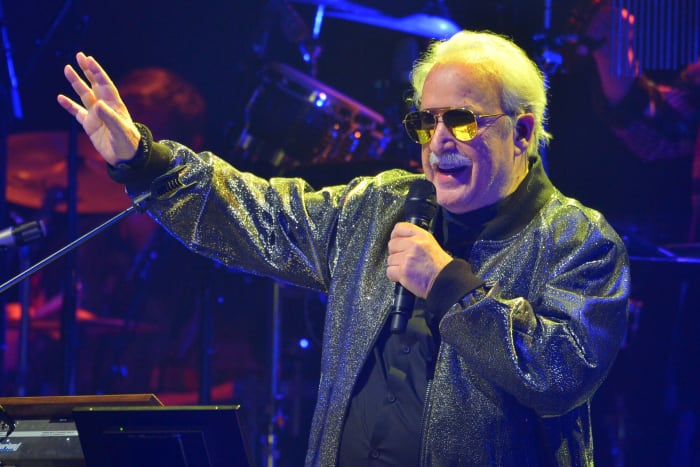
Few people love pop music as much as Giorgio Moroder does. An Italian-born music fan who experimented with many synthesizer recording techniques, Moroder spent many years as a small-time solo artist before finding kinship with powerhouse vocalist Donna Summer. The arpeggiated synth rolls he came up with for breakthrough song "I Feel Love" were as futuristic as they were funky, hypnotizing an entire generation of club-goers. While Moroder also helped bring Summer's Bad Girls era to life, he would never stop tinkering with synths and sounds, working with artists from across the spectrum including Blondie, Sparks, and Berlin.
Always adept at changing his sound to fit different tones and moods, Moroder found immense success working on Hollywood soundtracks, doing everything from the scores for Midnight Express and Scarface to winning Oscars for his collaborations on the songs from Flashdance and Top Gun. While he hasn't been as active a songwriter in recent years, a hip collaboration with Daft Punk landed him a whole new audience, while the third season of the series Stranger Things exposed a whole new generation to his theme from The NeverEnding Story. Even in his 80s, he'll always be the coolest guy in any room.
Evan Sawdey is the Interviews Editor at PopMatters, and has written for the likes SPIN, Entertainment Weekly, and several other sites. He currently hosts the 'Worldwide Tea' International Drag Race podcast. He lives in Los Angeles with his wonderful husband and can be found on most socials @SawdEye.
More must-reads:
Customize Your Newsletter
 +
+
Get the latest news and rumors, customized to your favorite sports and teams. Emailed daily. Always free!
PRIVACY POLICY EDITORIAL POLICY CONTACT US
ABOUT YARDBARKER TERMS OF SERVICE
Use of this website (including any and all parts and
components) constitutes your acceptance of these
Terms of Service and Privacy Policy.
This site is for entertainment purposes only.
There is no gambling offered on this site.
Gambling Problem? Call 1-800-Gambler.

